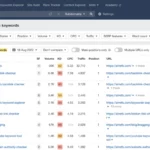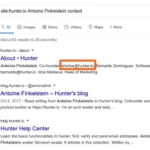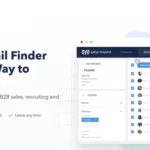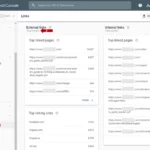The purpose of keyword research is to identify the specific words and phrases that people use when searching for information online. By understanding these keywords, you can optimize your website’s content to align with the search intent of your target audience and increase your chances of ranking higher in search engine results.
What is Keyword Research?

Keyword research is the process of identifying and analyzing the terms and phrases that people use when searching for information on search engines like Google. It involves understanding the language and vocabulary used by your target audience to optimize your website’s content and improve its visibility in search engine results pages (SERPs). By conducting keyword research, you can discover the specific words and phrases that are relevant to your industry or niche, allowing you to create content that aligns with the search intent of your target audience. This research helps you uncover high-volume keywords that have the potential to drive organic traffic to your website. It also allows you to identify long-tail keywords, which are longer and more specific search queries that often have less competition. Ultimately, keyword research helps you understand what your audience is looking for, enabling you to tailor your content to meet their needs and increase your website’s chances of ranking higher in search engine results. So, let’s explore why keyword research is so important for your SEO strategy.
Why is Keyword Research Important?

Keyword research is an essential component of any successful SEO strategy. Here are a few reasons why keyword research is important:
1. Understanding User Intent: Keyword research helps you gain insights into the search intent of your target audience. By identifying the specific keywords and phrases they use, you can create content that aligns with their needs and provides relevant information.
2. Improving Organic Traffic: By targeting high-volume keywords that are relevant to your industry or niche, you can increase your website’s visibility in search engine results. This can lead to a higher number of organic visitors and potential customers.
3. Competitive Advantage: Keyword research allows you to identify keywords that your competitors may be targeting. By understanding their strategies, you can find opportunities to differentiate your content and attract a larger share of the target audience.
4. Long-Tail Keyword Opportunities: Keyword research helps you identify long-tail keywords, which are longer and more specific search queries. These keywords often have less competition and can be easier to rank for, allowing you to attract targeted traffic to your website.
5. Content Optimization: By conducting keyword research, you can optimize your website’s content to include relevant keywords. This can improve your website’s relevance and authority in the eyes of search engines, leading to higher rankings and increased organic traffic.
Keyword research is important because it helps you understand your target audience, improve organic traffic, gain a competitive advantage, identify long-tail keyword opportunities, and optimize your content for better rankings. By incorporating keyword research into your SEO strategy, you can enhance your website’s visibility and attract more qualified traffic. To learn more about how to sell SEO services, check out our comprehensive guide.
Choosing the Right Keywords

Choosing the right keywords is essential for the success of your SEO strategy. It involves understanding the search intent of your target audience and identifying relevant topics to create content around. Here are some key steps to help you choose the right keywords:
1. Understanding Search Intent: Search intent refers to the reason behind a user’s search query. It can be categorized into four types: informational, navigational, transactional, and commercial investigation. By understanding the search intent behind your target keywords, you can create content that aligns with what users are looking for.
2. Identifying Relevant Topics: Once you understand the search intent, it’s important to identify relevant topics that are related to your industry or niche. These topics should be aligned with your business goals and target audience. Conducting competitor research and using tools like Ahrefs’ Content Explorer can help you identify popular topics in your industry.
3. Using Ahrefs for Keyword Research: Ahrefs offers a range of features and tools that can assist you in choosing the right keywords. The Keyword Explorer tool allows you to generate keyword ideas, analyze search volumes, and assess keyword difficulty. The Content Gap tool helps you identify keywords that your competitors are ranking for but you are not. By leveraging these tools, you can uncover valuable keyword opportunities.
By following these steps and utilizing the features provided by Ahrefs, you can effectively choose the right keywords for your SEO strategy. Remember to focus on keywords that have a high search volume, low competition, and align with the search intent of your target audience. So, let’s dive deeper into the features offered by Ahrefs for keyword research.
Understanding Search Intent
Understanding search intent is a crucial aspect of keyword research. Search intent refers to the underlying motivation or purpose behind a user’s search query. By understanding the intent behind a search, you can create content that aligns with what the user is looking for. There are four main types of search intent:
1. Informational intent: Users are looking for information or answers to their questions. These searches often start with words like “how to,” “what is,” or “tips for.” For example, someone searching for “how to sell SEO” is likely looking for information on selling SEO services. (source)
2. Navigational intent: Users are looking for a specific website or web page. These searches often include brand names or specific URLs. For example, someone searching for “why are my backlinks not showing up” may be looking for a specific article or forum thread discussing the issue. (source)
3. Commercial intent: Users are in the research phase and are looking to compare products or services before making a purchase. These searches often include terms like “best,” “reviews,” or “vs.” For example, someone searching for “how to use Ahrefs for free” may be considering whether to purchase the tool and wants to explore if there are any free alternatives available. (source)
4. Transactional intent: Users are ready to make a purchase or take a specific action. These searches often include terms like “buy,” “discount,” or “coupon.” For example, someone searching for “buy Ahrefs subscription” is likely ready to purchase the tool.
Understanding the search intent behind keywords is crucial because it helps you create content that meets the needs of your target audience. By aligning your content with the user’s intent, you can increase the chances of attracting relevant traffic and converting visitors into customers. Now that we have a better understanding of search intent, let’s move on to identifying relevant topics for keyword research.
Identifying Relevant Topics
Identifying relevant topics is a crucial step in keyword research. It involves finding the main themes or subjects that are closely related to your industry or niche. By identifying these topics, you can create content that addresses the interests and needs of your target audience. Here are a few strategies to help you identify relevant topics:
1. Brainstorming: Start by brainstorming a list of general topics that are relevant to your business. Think about the main categories or themes that your products or services fall under.
2. Industry Trends: Stay updated with the latest industry trends and news. This will help you identify emerging topics that are currently popular or gaining traction in your industry.
3. Customer Feedback: Pay attention to the questions, comments, and feedback you receive from your customers. This can provide valuable insights into the topics they are interested in and the problems they need solutions for.
4. Competitor Analysis: Analyze the content and keywords that your competitors are targeting. This can give you ideas for relevant topics that you may have overlooked.
5. Keyword Research Tools: Utilize keyword research tools like Ahrefs’ Keyword Explorer to generate keyword ideas and explore related topics. These tools provide data on search volume, keyword difficulty, and related keywords, helping you identify topics that are popular and have potential for ranking.
By implementing these strategies, you can identify relevant topics that resonate with your target audience and optimize your content accordingly. Remember, the goal is to create valuable and informative content that addresses the needs of your audience and positions you as an authority in your industry.
Using Ahrefs for Keyword Research
Using Ahrefs for keyword research is a game-changer for any SEO professional or website owner. Ahrefs offers a suite of powerful tools and features that make the process of keyword research efficient and effective. Here are some key ways you can leverage Ahrefs for your keyword research:
1. Keyword Explorer: Ahrefs’ Keyword Explorer tool allows you to find relevant keywords by entering a seed keyword or a specific topic. It provides you with a comprehensive list of keyword ideas, along with key metrics such as search volume, keyword difficulty, and click-through rate (CTR). The tool also offers keyword suggestions, related keywords, and questions related to your topic, giving you a deeper understanding of what your audience is searching for.
2. Content Gap: Ahrefs’ Content Gap feature enables you to analyze the keywords your competitors are ranking for but you are not. By entering your domain and your competitors’ domains, you can uncover valuable keyword opportunities that can help you outrank your competition. This feature helps you identify gaps in your content strategy and develop a plan to target those keywords.
3. Competitor Analysis: Ahrefs allows you to analyze the keywords your competitors are ranking for, giving you insights into their SEO strategies. By understanding which keywords your competitors are targeting, you can identify new keyword opportunities for your website. Additionally, Ahrefs provides data on the organic search traffic your competitors are receiving, allowing you to benchmark your performance against theirs.
With Ahrefs’ user-friendly interface and robust features, you can streamline your keyword research process and make data-driven decisions for your SEO strategy. So, let’s dive into the next section and explore the various features of Ahrefs’ keyword research capabilities.
Ahrefs Keyword Research Features
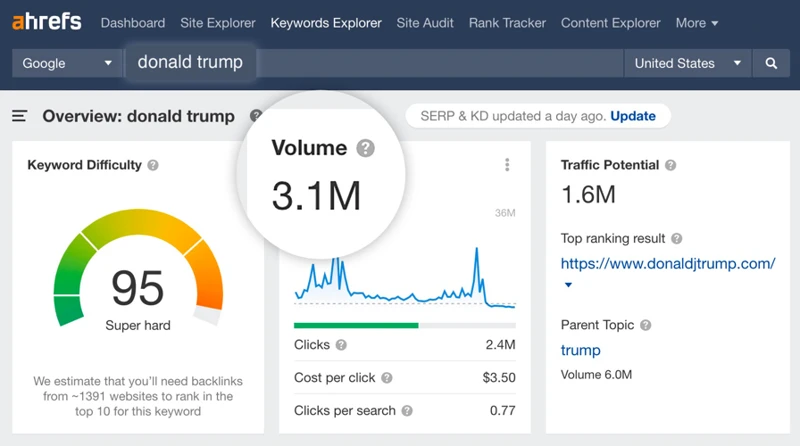
Ahrefs provides a range of powerful features for conducting keyword research. These features help you uncover valuable insights and data to optimize your website’s content and improve its search engine visibility. Here are some key features offered by Ahrefs for keyword research:
1. Keyword Explorer: Ahrefs’ Keyword Explorer allows you to search for keywords and get detailed metrics and insights. It provides information such as search volume, keyword difficulty, and click-through rate (CTR) potential. This feature helps you discover relevant keywords and understand their potential value for your SEO strategy.
2. Content Gap: With Ahrefs’ Content Gap tool, you can analyze the keywords that your competitors are ranking for but you are not. This feature helps you identify keyword opportunities and create content that can outrank your competitors in search engine results.
3. Competitor Analysis: Ahrefs allows you to analyze the keywords that your competitors are targeting and ranking for. This feature helps you identify their top-performing keywords and incorporate them into your own strategy. You can also analyze their backlink profiles to understand their link-building strategies.
4. Rank Tracker: Ahrefs’ Rank Tracker feature allows you to monitor your website’s ranking positions for specific keywords over time. This feature helps you track your progress and make data-driven decisions to improve your keyword targeting and SEO efforts.
5. Keyword Difficulty: Ahrefs provides a keyword difficulty metric that helps you assess how challenging it would be to rank for a particular keyword. This feature allows you to prioritize keywords based on their difficulty level and focus on those with a higher chance of ranking.
Ahrefs’ keyword research features provide valuable insights and data to optimize your website’s content and improve its search engine visibility. By leveraging these features, you can identify relevant keywords, analyze competitor strategies, and track your progress over time. So, let’s dive into creating a comprehensive keyword research strategy with Ahrefs.
Keyword Explorer
The Keyword Explorer tool in Ahrefs is a powerful feature that allows you to conduct in-depth keyword research. With this tool, you can enter a specific keyword or topic and get detailed insights into its search volume, keyword difficulty, and click potential. The tool provides you with a list of related keywords, along with important metrics such as search volume, keyword difficulty score, and click potential. This information helps you identify keywords that have a high search volume and low competition, making them ideal targets for your SEO efforts. The Keyword Explorer also provides you with keyword ideas based on popular search queries, allowing you to discover new and relevant keyword opportunities. Additionally, you can analyze the SERP overview for a specific keyword to see the top-ranking pages and their backlink profiles. This information is invaluable as it allows you to understand the competition and plan your content strategy accordingly. The Keyword Explorer tool in Ahrefs is a must-have for any marketer or SEO professional looking to optimize their website and increase organic traffic. So, let’s dive into this feature and see how it can benefit your keyword research strategy.
Content Gap
Content Gap analysis is a powerful feature offered by Ahrefs that allows you to identify the keywords your competitors are ranking for, but you are not. By analyzing this gap in content, you can uncover valuable opportunities to create new content or optimize existing content to target these keywords and gain a competitive edge. The Content Gap tool in Ahrefs enables you to compare your website with up to ten competitors simultaneously. It provides you with a comprehensive list of keywords that your competitors are ranking for, but you are not. This information helps you understand the keywords you might be missing out on and gives you insights into the content you need to create or improve to fill those gaps. By targeting these keywords, you can increase your website’s visibility, attract more organic traffic, and potentially outrank your competitors in search engine results. The Content Gap feature in Ahrefs is a valuable resource for conducting in-depth competitor analysis and developing a strategic content plan to stay ahead in your industry. So, let’s explore how to effectively utilize the Content Gap feature in Ahrefs for your keyword research strategy.
Competitor Analysis
Competitor analysis is a crucial aspect of keyword research that allows you to gain valuable insights into your competitors’ strategies and identify opportunities for your own website. By analyzing your competitors’ keywords, you can discover which terms and phrases they are targeting and how well they are ranking for those keywords. This information can help you identify gaps in the market and uncover untapped keyword opportunities. Ahrefs provides a powerful Competitor Analysis feature that allows you to enter the domain of your competitors and see the keywords they are ranking for. You can also view their top pages, backlinks, and other important SEO metrics. By analyzing your competitors’ keywords, you can gain a deeper understanding of the competitive landscape in your industry and find ways to differentiate yourself. This information can inform your content strategy and help you optimize your website to outrank your competitors. So, make sure to leverage the Competitor Analysis feature in Ahrefs to stay ahead of the game and gain a competitive edge in your SEO efforts.
Creating a Keyword Research Strategy
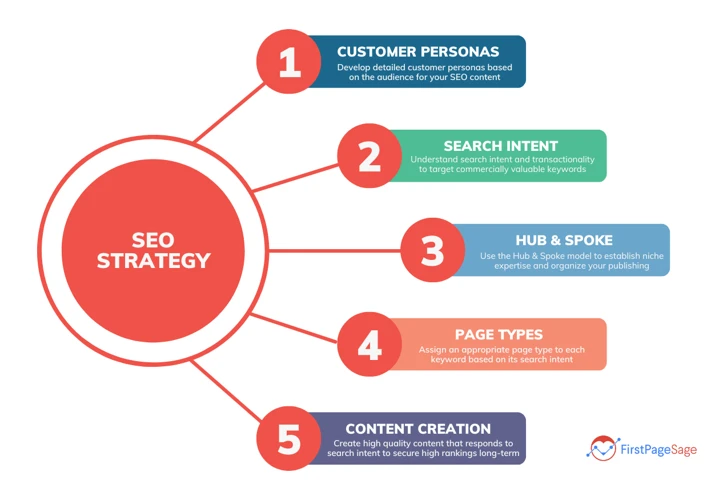
Creating a keyword research strategy is crucial for maximizing the effectiveness of your SEO efforts. To start, you need to set clear goals for your keyword research. Determine what you want to achieve with your SEO strategy, whether it’s increasing website traffic, generating leads, or boosting sales. Once you have your goals in mind, you can move on to identifying long-tail keywords. These are specific and often longer search queries that have less competition but can drive highly targeted traffic to your website. Use tools like Ahrefs’ Keyword Explorer to find long-tail keywords that align with your goals and target audience. Another important aspect of creating a keyword research strategy is organizing your keywords. Group them into themes or categories based on relevance and search intent. This will help you create targeted content and optimize your website for multiple keywords within each theme. By having a well-organized keyword strategy, you can ensure that your content is focused and aligned with what your audience is searching for. So, take the time to plan and create a solid keyword research strategy to maximize the impact of your SEO efforts.
Setting Goals
When it comes to keyword research, setting goals is an essential step to ensure that you are targeting the right keywords for your website. Here are some key considerations for setting goals in your keyword research strategy:
1. Target Audience: Understand who your target audience is and what they are searching for. Consider their demographics, interests, and pain points to identify relevant keywords that will attract the right visitors to your website.
2. Search Volume: Determine the search volume for your target keywords. This will help you gauge the potential traffic and visibility that these keywords can bring to your website.
3. Competition: Assess the competition level for your target keywords. Look at the top-ranking websites for those keywords and evaluate their domain authority, backlink profile, and content quality. This will give you an idea of the difficulty of ranking for those keywords.
4. Relevance: Ensure that the keywords you choose are highly relevant to your content and align with your website’s overall theme. This will help improve user experience and increase the chances of ranking higher in search results.
5. Conversion Potential: Consider the conversion potential of your target keywords. Focus on keywords that have a higher likelihood of driving relevant traffic to your website and converting them into customers or leads.
By setting clear and specific goals for your keyword research, you can streamline your efforts and prioritize the keywords that will have the most impact on your website’s visibility and success. So, take the time to define your goals before diving into the keyword research process.
Identifying Long-Tail Keywords
Identifying long-tail keywords is a crucial aspect of keyword research. These are longer and more specific search queries that usually have a lower search volume but higher conversion rates. While short-tail keywords are more general and competitive, long-tail keywords are more specific and targeted, allowing you to attract a more qualified audience to your website.
To identify long-tail keywords, you can start by brainstorming relevant topics and then expanding on them with more specific phrases. For example, if you have a website about healthy recipes, you can narrow down your keyword list by adding modifiers like “easy healthy recipes for beginners” or “quick and healthy dinner ideas.” These longer, more specific phrases will likely have less competition, making it easier for your website to rank higher in search results.
Another method to identify long-tail keywords is by using the Ahrefs Keyword Explorer tool. By entering a seed keyword or a phrase related to your topic, you can generate a list of keyword suggestions that include long-tail variations. The tool provides data on search volume, keyword difficulty, and other relevant metrics to help you determine which long-tail keywords are worth targeting.
Remember, long-tail keywords may have lower search volume, but they often have higher intent and conversion rates. By incorporating these specific keywords into your content, you can attract a more targeted audience that is more likely to engage with your website and convert into customers. So, make sure to include long-tail keywords in your keyword research strategy for better results.
Organizing Keywords
Organizing keywords is a crucial step in the keyword research process. By effectively organizing your keywords, you can streamline your SEO strategy and maximize the impact of your content. Here are some strategies to help you organize your keywords effectively:
1. Categorization: Group similar keywords into categories or themes. This will help you identify common topics and create focused content that targets specific keywords. For example, if you have a website about cooking, you can categorize keywords into topics like “desserts,” “healthy recipes,” or “meal planning.”
2. Keyword Mapping: Once you have categorized your keywords, create a keyword map that outlines which keywords will be targeted on each page of your website. This ensures that each page is optimized for a specific set of keywords and helps search engines understand the relevance of your content.
3. Prioritization: Prioritize your keywords based on their search volume, competition, and relevance to your target audience. Focus on keywords with high search volume and low competition to increase your chances of ranking higher in search engine results.
4. Tracking: Use a keyword tracking tool to monitor the performance of your keywords over time. This will help you identify which keywords are driving the most traffic and conversions, allowing you to optimize your content and SEO strategy accordingly.
By organizing your keywords effectively, you can create a structured approach to keyword targeting and improve the overall effectiveness of your SEO efforts. So, take the time to analyze and categorize your keywords, and watch as your website’s visibility and organic traffic soar. For more tips on how to sell SEO, check out this helpful guide.
Executing Keyword Research with Ahrefs
Executing keyword research with Ahrefs is a straightforward and efficient process that can help you uncover valuable insights for your SEO strategy. Here are some steps to follow when using Ahrefs for keyword research:
1. Using Filters and Sorting Options: Ahrefs provides various filters and sorting options to narrow down your keyword research. You can filter keywords by search volume, keyword difficulty, and other metrics to find the most relevant and valuable keywords for your website. Sorting options like alphabetical order or by search volume can help you organize and prioritize your keyword list.
2. Analyzing Keyword Difficulty: Ahrefs’ Keyword Difficulty metric allows you to assess the competitiveness of a keyword. This helps you understand how difficult it will be to rank for a specific keyword. By analyzing keyword difficulty, you can focus on keywords that have a higher chance of ranking well in search engine results.
3. Exploring Related Keywords: Ahrefs provides a “Related Keywords” feature that suggests other keywords related to your initial search term. This feature helps you uncover additional keyword opportunities and expand your keyword list. By targeting related keywords, you can capture a wider range of search traffic and increase your website’s visibility.
4. Analyzing SERP Features: Ahrefs’ SERP Features report allows you to see the different types of search results that appear for a specific keyword. This information helps you understand the intent behind the keyword and optimize your content accordingly. By analyzing SERP features, you can tailor your content to match the search intent of your target audience and increase your chances of ranking higher in search engine results.
By following these steps and utilizing the features and tools provided by Ahrefs, you can effectively execute keyword research and gain valuable insights for your SEO strategy. So, let’s dive into Ahrefs and start uncovering high-value keywords for your website.
Using Filters and Sorting Options
When it comes to conducting keyword research with Ahrefs, using filters and sorting options can greatly enhance your efficiency and effectiveness. Ahrefs provides a wide range of filters and sorting options that allow you to narrow down your keyword list and find the most relevant and valuable keywords for your website.
One of the key filters you can use is the search volume filter. This filter allows you to specify a minimum and maximum search volume range, helping you focus on keywords that receive a desirable amount of monthly searches. By setting a minimum search volume, you can eliminate low-traffic keywords that may not be worth your effort. Conversely, by setting a maximum search volume, you can filter out highly competitive keywords that may be difficult to rank for.
Another useful filter is the keyword difficulty filter. This filter allows you to specify a maximum keyword difficulty score, which indicates how difficult it is to rank for a particular keyword. By setting a maximum keyword difficulty, you can identify keywords that have a reasonable chance of ranking well without facing too much competition.
Sorting options are also available in Ahrefs to help you organize and prioritize your keyword list. You can sort keywords by search volume, keyword difficulty, or even by the number of clicks a keyword generates. Sorting by search volume allows you to identify keywords with the highest potential traffic, while sorting by keyword difficulty helps you find keywords that are easier to rank for. Sorting by clicks can be useful to prioritize keywords that drive actual traffic to websites, rather than just search volume.
By utilizing filters and sorting options in Ahrefs, you can streamline your keyword research process and focus on the most valuable keywords for your website. These features enable you to save time and effort by quickly identifying keywords that align with your goals and have the potential to drive targeted organic traffic. So, make sure to leverage these powerful tools in Ahrefs to optimize your keyword research strategy.
Analyzing Keyword Difficulty
Analyzing keyword difficulty is a crucial step in keyword research as it helps you determine the level of competition you will face when trying to rank for a particular keyword. Ahrefs provides a powerful feature called Keyword Difficulty that allows you to assess the level of difficulty for a keyword on a scale from 0 to 100. The higher the score, the more challenging it will be to rank for that keyword. By analyzing keyword difficulty, you can focus your efforts on keywords that have a lower difficulty score and are more achievable to rank for. This feature takes into account various factors such as the number of referring domains, the authority of the websites ranking on the first page, and the overall competitiveness of the keyword. Additionally, Ahrefs provides a SERP Analysis feature that allows you to see the top-ranking pages for a specific keyword. This information can help you understand the quality of content you need to create in order to compete with the top-ranking pages. By analyzing keyword difficulty, you can make informed decisions about which keywords to target and prioritize in your content strategy. This will ultimately increase your chances of ranking higher in search engine results and driving organic traffic to your website. So, let’s dive into Ahrefs and explore how to analyze keyword difficulty step by step.
Exploring Related Keywords
Exploring related keywords is an essential step in keyword research, as it allows you to uncover additional opportunities to optimize your content and target a wider range of search queries. Ahrefs provides a powerful feature called “Keyword Explorer” that enables you to explore related keywords and discover their search volume, difficulty, and potential traffic value. When using this feature, you can enter a seed keyword or a specific topic and Ahrefs will generate a list of related keywords based on their relevance to your query. This feature also provides valuable insights such as keyword difficulty, which indicates how challenging it would be to rank for a particular keyword. By exploring related keywords, you can identify variations and synonyms that your target audience may be using to search for your products or services. This allows you to optimize your content with these related keywords, increasing the chances of your website ranking higher in search engine results and attracting more organic traffic. So, make sure to take advantage of Ahrefs’ Keyword Explorer to uncover a wide range of related keywords and optimize your content effectively.
Conclusion
In conclusion, keyword research is a vital component of any successful SEO strategy. By understanding the search intent of your target audience and identifying relevant keywords, you can optimize your website’s content to rank higher in search engine results. Ahrefs provides powerful tools and features that make the keyword research process easier and more effective. With the Keyword Explorer, Content Gap, and Competitor Analysis tools, you can uncover high-volume keywords, identify content gaps, and analyze your competitors’ strategies. By setting clear goals, identifying long-tail keywords, and organizing your keywords effectively, you can create a solid keyword research strategy using Ahrefs. The filters and sorting options within Ahrefs allow you to narrow down your keyword selection based on various factors, such as search volume and keyword difficulty. Additionally, exploring related keywords can help you discover new opportunities and expand your content strategy. Overall, with the help of Ahrefs, you can enhance your keyword research process and drive more organic traffic to your website. So, start implementing these strategies and watch your website soar in the search engine rankings.
Frequently Asked Questions
What is the purpose of keyword research?
The purpose of keyword research is to identify the specific words and phrases that people use when searching for information online. By understanding these keywords, you can optimize your website’s content to align with the search intent of your target audience and increase your chances of ranking higher in search engine results.
How does keyword research benefit my website?
Keyword research benefits your website by helping you understand what your target audience is looking for. By incorporating relevant keywords into your content, you can attract more organic traffic, improve your website’s visibility in search engine results, and ultimately increase your chances of converting visitors into customers.
What is search intent and why is it important?
Search intent refers to the reason behind a user’s search query. Understanding search intent is important because it helps you create content that aligns with what users are looking for. By matching your content to their intent, you can provide more relevant information and increase the chances of your website appearing in search results.
How can Ahrefs help with keyword research?
Ahrefs offers a range of powerful features and tools to assist with keyword research. Their Keyword Explorer tool allows you to discover high-volume keywords, analyze search volumes, and explore related terms. Additionally, Ahrefs provides competitor analysis and content gap analysis features to help you understand what keywords your competitors are targeting and identify opportunities for your own website.
What are long-tail keywords?
Long-tail keywords are longer and more specific search queries that often have lower search volumes compared to broader keywords. They usually consist of three or more words and are highly targeted. Targeting long-tail keywords can be beneficial as they tend to have less competition and attract more qualified traffic to your website.
How do I organize my keywords?
Organizing your keywords is essential for effective keyword research. You can create keyword groups or categories based on relevance, search volume, or search intent. Using tools like spreadsheets or keyword management software can help you keep track of your keywords and their respective metrics.
What is keyword difficulty?
Keyword difficulty is a metric that indicates how challenging it is to rank for a particular keyword. It takes into account factors such as the number of websites already ranking for that keyword, their authority, and the quality of their content. A higher keyword difficulty score means it may be more difficult to rank for that keyword.
How do I analyze keyword difficulty?
Ahrefs provides a keyword difficulty metric that can help you analyze the difficulty of ranking for a specific keyword. The metric ranges from 0 to 100, with higher numbers indicating higher difficulty. By analyzing keyword difficulty, you can prioritize your keyword targets and focus on those that are more achievable based on your website’s authority and resources.
What is a content gap analysis?
A content gap analysis is the process of identifying topics or keywords that your competitors are ranking for, but you are not. By conducting a content gap analysis using Ahrefs, you can uncover opportunities to create new content or optimize existing content to target keywords that your competitors are already ranking for.
How do I set goals for my keyword research strategy?
To set goals for your keyword research strategy, consider factors such as your website’s current performance, your target audience, and your business objectives. Determine specific metrics you want to improve, such as organic traffic, keyword rankings, or conversions. Setting clear goals will help you stay focused and measure the success of your keyword research efforts.



